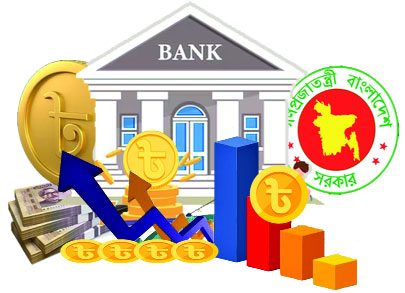Foreign investors need competitive policy support
Mahfuja Mukul: The accumulated debt of the government from internal sources has exceeded Tk 8.5 lakh crore. In one year, the amount of loan taken by the government from this source has increased by more than Tk 1.8 thousand crore. In March 2023, the accumulated debt of the government from internal sources was Tk 745,766 crore, which increased to Tk 8,54,500 crore in the same month of 2024. This information is available from a report of Bangladesh Bank yesterday.
Meanwhile, the accumulated debt of the government has increased, but the debt of the government from internal sources has decreased in July-March of the current financial year 2023-24. According to the report, the actual internal source debt of the government for July-March of the current financial year stood at Tk 46,877 crore, which was Tk 65,465 crore in the same period of the previous financial year. As compared to the last financial year, the debt of the government from internal sources has decreased by Tk 18,588 crores in the first 9 months of the current financial year.
Non-banks account for most of accumulated debt of govt now
At the end of last March, the debt status in this sector stood at Tk 4 lakh 33 thousand 405 crores. The government takes non-bank loans from various institutions and individuals by selling savings certificates, bills and bonds. Till the same time, the loan taken from the bank sector stands at Tk 4 lakh 21 thousand 95 crores. Direct loans taken by the government from Bangladesh Bank and Scheduled Banks are the loans of the banking sector.
According to the data of Bangladesh Bank, in the first 9 months of the current financial year, the government has taken less loans from Bangladesh Bank and other scheduled banks compared to the same period of the previous year. In July-March of the current financial year, the amount of direct borrowing by the government from Bangladesh Bank and other scheduled banks was Tk 34,782 crores. In the same period of the previous financial year, the actual debt of the government in the bank was Tk 61,431 crores. In other words, the debt of the government from this sector has decreased by Tk 26,649 crores in 9 months.
Last July-March government’s borrowing from banks decreased but the amount of loans from the non-banking sector increased. In the first nine months of the current financial year, the government’s actual debt from this sector stood at Tk 12,095 crore, which was Tk 4 thousand 34 crore in the same period of the previous financial year.
According to the data of Bangladesh Bank, the government has borrowed a total of Tk 24,640 crore from the non-banking sector in the mentioned 9 months. Of this, the government has returned Tk 12,950 crore for the original savings certificate. As a result, the government’s real debt from the non-banking sector has come down to Tk 12,000 crore.
Since last July, Bangladesh Bank has almost stopped lending to the government due to rising inflation. Although direct borrowing from banks has decreased, government borrowing through treasury bills and bonds has increased since the beginning of this year. Now it is getting more intense. According to the latest data of Bangladesh Bank, the government has taken a net loan of Tk 61,320 crore from the banking sector in the first 11 months of the current financial year (July-May).
According to the report of the central bank, the total status of the government’s bank loans till May 29 stood at Tk 4 lakh 55 thousand 98 crores, which was Tk 3 lakh 93 thousand 778 crores at the end of June 30. According to this, in the first 11 months of the financial year, the amount of net bank debt of the government stood at Tk 61,320 crores. However, from last July 1 to December 30, the government’s loan status from the banking system was in the negative trend of about Tk 6,634 crores.
Inflation has been on an upward trend since the beginning of the outgoing year. So, the economists were advising the government to stop borrowing from the banks. Because when the government borrows from the bank increases during high inflation, it indirectly increases the inflation. Because of this, Bangladesh Bank stopped lending to the government as an initiative to control inflation. Still inflation is not under control. Rather, inflation is increasing day by day.
Meanwhile, despite the liquidity crisis in the banking sector, the government has increased the target of borrowing from banks by 3.85 percent in the 2024-25 fiscal year budget. To meet the deficit budget, a target of taking a loan of Tk 137,500 crore from banks has been set in the next financial year, which is more than 17 percent of the announced budget.
During the budget announcement for the current financial year 2023-24, the target of borrowing from the banking sector was Tk 1 lakh 32 thousand 395 crores. In the revised budget last Thursday, this target has been increased to Tk 1 lakh 55 thousand 935 crores.
When asked, former Chairman of Association of Bankers Bangladesh and Managing Director of Mutual Trust Bank (MTB) Syed Mahbubur Rahman told that the government has to take loans from banks due to its inability to increase tax GDP. At present, banks do not have investments in the private sector. So, the government can give loans. His money can always pay, not that.
He said that if the global and domestic markets are fine, the demand for private sector loans will increase. Then there will be pressure to lend. If banks fail to lend at that time, the economic situation will worsen. And the government must have the ability to repay the debt. There is no benefit if you pay the bank with a bank loan.
Rare Israeli airstrike in Beirut kills Hezbollah commander and more than a dozen others
International Desk: Israel launched a rare airstrike that killed a senior Hezbollah milita…








